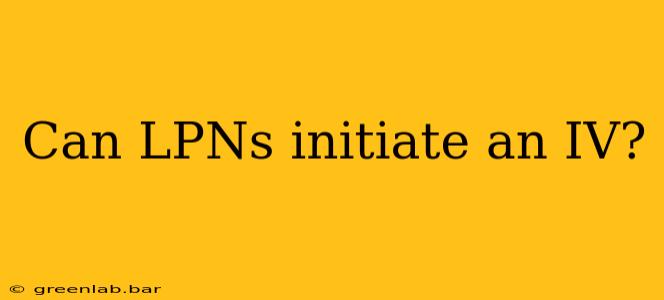The question of whether Licensed Practical Nurses (LPNs) or Licensed Vocational Nurses (LVNs) can initiate intravenous (IV) therapy is a complex one, with the answer varying significantly depending on the state, facility policies, and the LPN's specific training and certification. There's no single, universally applicable answer.
Understanding the Scope of Practice for LPNs/LVNs
LPNs/LVNs possess a vital role in healthcare, providing direct patient care under the supervision of physicians, registered nurses (RNs), or other licensed healthcare professionals. Their scope of practice, however, is defined by state regulations and the employing healthcare facility. While some states may allow LPNs to perform certain aspects of IV therapy, others strictly prohibit it. This is a crucial distinction to understand.
Key Factors Determining IV Initiation by LPNs:
-
State Laws: Each state's Board of Nursing dictates the specific legal parameters of LPN/LVN practice. Some states explicitly allow LPNs to initiate IVs, especially in specific settings or under a collaborative practice agreement with an RN or physician. Others may permit IV insertion only for maintenance, while others prohibit it entirely. Always check your state's regulations.
-
Facility Policies: Even in states where IV initiation is legally permissible for LPNs, individual healthcare facilities may have their internal policies restricting this procedure to RNs. These policies prioritize patient safety and ensure consistency of care.
-
Training and Certification: LPN programs vary in their curricula. Some programs may include extensive training in IV therapy, preparing graduates to competently initiate and maintain IV lines. However, additional certifications or specialized training may be needed to legally perform this procedure in certain states or settings. Continuing education is crucial to maintain proficiency and stay updated on best practices.
-
Supervision Levels: In many cases, even when permitted, LPNs may need to operate under the direct or indirect supervision of a registered nurse or physician. This supervision ensures appropriate oversight and immediate access to experienced support.
The Role of RNs in IV Therapy
Registered Nurses typically have a broader scope of practice regarding IV therapy. They often have more extensive education and training in administering IV medications, managing complications, and assessing patient responses. RNs typically take the lead in complex IV situations or those requiring advanced skills.
Implications for Patients
Patients should be aware that the ability of an LPN to initiate an IV depends on several factors beyond their control. It's essential to clarify with the healthcare facility if you have specific concerns or questions about who will be administering your IV therapy. Clear communication with your medical team is key to ensuring you receive the best possible care.
Conclusion: Seek Clarity from Your Healthcare Providers
Ultimately, whether or not an LPN can start your IV depends on a combination of factors. To determine the capabilities of the healthcare professionals attending to you, it's advisable to directly inquire with the nursing staff, your physician, or the facility's administration. Always advocate for your understanding of your care plan. This knowledge allows you to actively participate in your healthcare decisions and promote a safe and informed treatment process.

